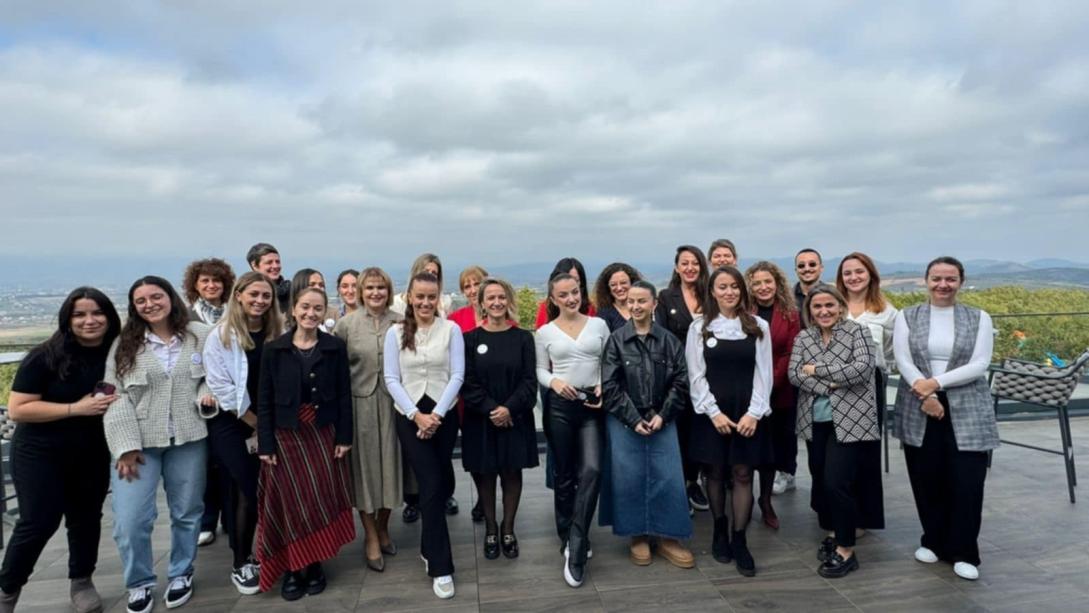Interview with Fatmire Terdevci

1. As a former woman journalist, do you think that women journalists face different challenges than men? As in any other profession, issues around work-live balance, pay gap, cultural issues, stereotypes, societal pressure, are part of everyday life of a women journalist. What do you think can be done about it? Are women pigeonholed in certain journalist roles and vetoed in others?
Women journalists play a vital role in shaping the media landscape, bringing diverse perspectives and voices. They make significant contributions across all areas of journalism, particularly on issues that benefit from a woman’s perspective, thereby promoting gender equality. However, their journey is not without challenges, including persistent stereotyping, underrepresentation in leadership roles, harassments and difficulties balancing family life with work. Additionally, women are often assigned to topics traditionally labelled as “soft,” such as entertainment, lifestyle, and culture. There is also a significant lack of women in political debates on television, with rare exceptions that reinforce the widespread stereotype that "politics is a man's job”.
Despite these challenges, Kosovo has seen many women journalists break these barriers, reporting on politics, economy, conflict zones, and sensitive issues, as well as excelling in investigative journalism. Over the years, several women journalists in Kosovo have received the EU Investigative Journalism Awards, underscoring their qualifications, talent, and impact in the field.
2. In Kosovo, women representation in management teams and advisory boards of media outlets and operators in Kosovo is scarce. Different reports have tried to demonstrate how women have been discriminated when applying for managerial positions. Do you think women have the same opportunities than men? Is harassment at the workplace an issue for women journalists?
While women journalists are active across diverse areas of reporting, their presence in leadership roles remains limited. Despite the large number of media outlets in Kosovo, only a few women hold top management or decision-making positions, highlighting the need for greater efforts to ensure gender equity at all levels of the profession.
3. The online media landscape seems to be placing more challenges than opportunities for women. Are there limits of the freedom of expression? Is self-regulation working?
Online media often poses more challenges than opportunities for women. Among the most pressing issues is online harassment and abuse, with women frequently targeted through hate speech, smear campaigns, and verbal attacks. In Kosovo, the systematic targeting of women public figures is widespread, aiming to silence or discredit them. Unfortunately, reporting mechanisms for such attacks are often slow, ineffective, or entirely unresponsive, leaving victims without adequate support or recourse. Of course, this is very discouraging for every woman.
To create a safer and more empowering online space for women, stronger regulations must be implemented to address online gender-based violence, hate speech, and harassment effectively. Additionally, promoting digital literacy is essential. Equipping women with knowledge about privacy settings, reporting mechanisms, and safe online practices will empower them to safely use online platforms.
4. You have followed closely the recent establishment of the Women Journalists Network of Kosovo. Can you explain to us what its objective is? How is it organised? Did it respond to a real need after some specific cases of discrimination or inequalities?
The Women Journalists Network of Kosovo, established in October this year, is a significant initiative aimed at fostering an inclusive environment for women in media. Its mission is to create a safe space for women journalists, combat the use of sexist and misogynistic language in public discourse, and address the challenges women face in their workplaces.
Since then, the network has actively responded to several cases where women journalists were obstructed or prevented from carrying out their work or became targets of derogatory language in public discourse. I firmly believe that this network possesses both the capacity and the determination to tackle the challenges women journalists encounter daily.
5. On reporting on women issues or on gender-based violence, do you think journalists in Kosovo are well prepared?
Reporting on women's issues and gender-based violence requires a high level of sensitivity and a deep understanding of the complexities involved. As such, journalists must be trained and aware of the ethical considerations when covering these topics. Specialized training programs can equip journalists with the tools to understand the context, use appropriate language, and, importantly, promote constructive narratives. This means emphasizing solutions, highlighting survivor resilience, and not focusing on violence alone.
